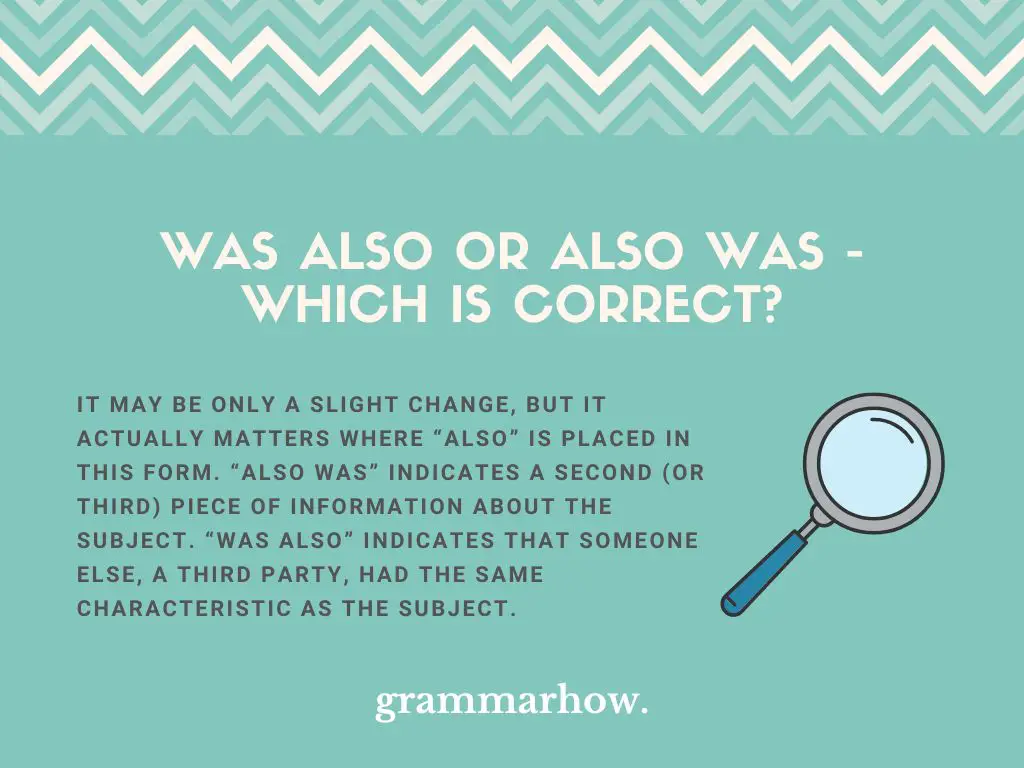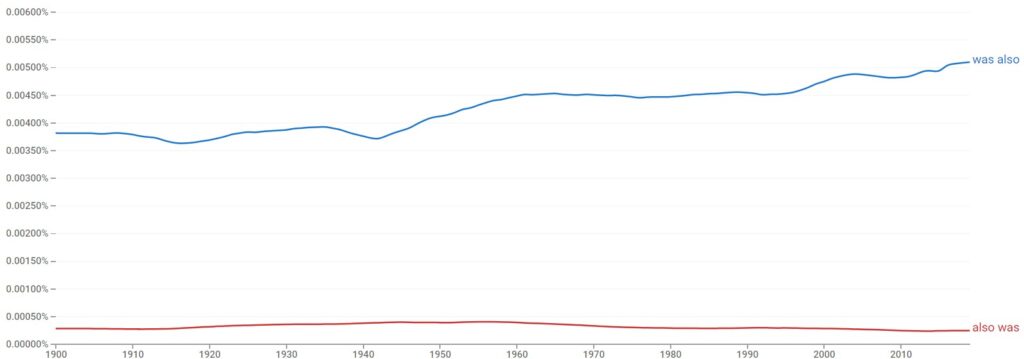Does it make a difference if we say “Was Also” or “Also Was”? In other words, does it affect the meaning of the sentence to place “Also” before or after “Was?
We want to find out if this change matters. And to do that, we’ll look at each form separately.
Was Also or Also Was – Which Is Correct?
It may be only a slight change, but it actually matters where “Also” is placed in this form. “Also Was” indicates a second (or third) piece of information about the subject. “Was Also” indicates that someone else, a third party, had the same characteristic as the subject.

Does it sound a bit confusing? Let’s look at some examples, as we try to make sense of how it works:
- John was a singer, but he was also a dancer.
- John was a singer, and his sister also was.
- I was afraid, and I was also hoping they would leave soon.
- I was afraid. Jenna also was, and we hoped they would leave soon.
In the first set of examples, “Was Also” and “Also Was” indicate two different scenarios. In the first sentence, we say John was a singer and also, a dancer. The expression “Was Also” indicates we’re adding another feature or characteristic to our subject.
In the second sentence, we say that both John and his sister were singers. In that scenario, “Also Was” brings the indication that John’s sister shared his talents.
The two sentences don’t have identical meanings, and the expressions “Was Also” and “Also Was” play a part in making sure that information is properly shared. The same principle goes for the second set of examples.
Was Also
“Was Also” indicates that we’re bringing up information, or describing another feature, ability or characteristic about our subject. Whatever it is we’re talking about, “Was Also” adds another layer of information about them.
Take a look at some examples below:
- Terry was very pretty. She was also with me.
- They were also at the party.
- Joanie told me she was happy, but was also hungry.
- The dog wanted to come inside the house, but it was also soaked in rain.
- I was incredibly happy with the outcome of the presentation, but also very tired of the long hours of preparation.
Our examples bring simple sentences and more complex ones, so you can see and understand how “Was Also” adds information to the conversation.
In fact, that’s the purpose of “Was Also”, to provide more information about the subject we’re discussing in the conversation.
Also Was
“Also Was” adds information about another person to the conversation. It indicates that someone else shares a common quality, feature or ability with the subject.
Take a look at the examples below:
- Wendy also was an artist, like me.
- Just like Melissa, Theo also was tired.
- I also was excited for the show, like the rest of the crowd.
- During therapy it became clear he also was willing to try it.
- I also was with Linda when it happened.
Directly or indirectly, “Also Was” works as a tool to explain the subject isn’t alone: someone else has something in common with him. “Also Was” brings more people to the conversation, and has a completely different purpose than “Was Also”.
Which Is Used the Most?
When sharing information with those around them, what do you think people say more often “Was Also” or “Also Was”? We have a graph from Google Ngram Viewer that will show us the answer to this question.

“Was Also” appears with much more frequency than “Also Was”. The difference is, in fact, quite considerable. We suppose it indicates that “Was Also” is the preferred form for most people.
“Also Was” has maintained fairly the same usage through the years. It’s very interesting to see that “Was Also”, on the other hand besides always being on top, is trending toward a continuous growth.
Final Thoughts
“Also Was” and “Was Also” aren’t quite the same, and convey different messages. Use “Also Was” to add information about the same subject to the conversation. Use “Was Also” to bring in information about a third party, who shares something in common with the subject.
You may also like:
Is Also or Also Is – Which Is Correct? (Helpful Examples)
Also Have or Have Also – Which Is Correct? (Helpful Examples)
Also Has or Has Also – Which Is Correct? (Helpful Examples)

Martin holds a Master’s degree in Finance and International Business. He has six years of experience in professional communication with clients, executives, and colleagues. Furthermore, he has teaching experience from Aarhus University. Martin has been featured as an expert in communication and teaching on Forbes and Shopify. Read more about Martin here.

